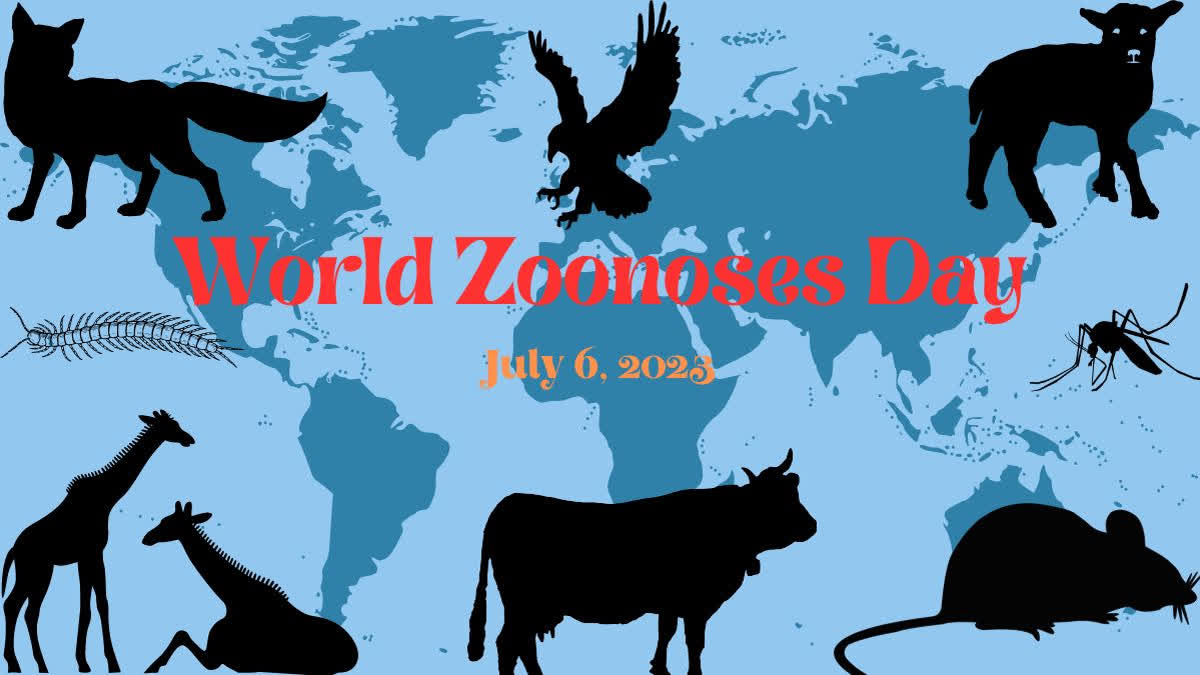Hyderabad: In the past decade, there has been a significant increase in the cases of diseases and infections caused and spread by animals worldwide. It is estimated that about one billion more or less severe cases of zoonotic diseases occur every year globally causing millions of deaths. Due to the emergence of new types of zoonotic infections in the last few decades, and their ability to spread rapidly, they are also being considered a matter of serious concern for global health security.
"Zoonotic Infections" or diseases are diseases that can spread from animals to humans. At the same time, under certain circumstances, the infection can also spread from humans to animals. Such a condition is called "Reverse Zoonoses". Zoonotic infections can be spread in humans by direct or indirect contact with an infected animal's saliva, blood, urine, mucus, faeces, or other body fluids. Vector-borne diseases also come in this type of diseases which are spread by ticks, mosquitoes or fleas.
Zoonotic diseases can be caused by bacteria, viruses, fungi or parasites, which can sometimes show serious and even fatal effects in humans. At present, there are more than 200 known zoonotic diseases worldwide. World Zoonoses Day or World Zoonoses Day is observed every year on July 6 to spread information and awareness among people about zoonotic infections. In the year 2023, World Zoonoses Day is being observed around the theme "One World, One Health: Prevent Zoonoses".
In the year 2020, a report titled 'Preventing the Next Pandemic: Zoonotic Diseases and How to Break the Chain of Transmission' was published by the United Nations Environment Programme and the 'International Livestock Research Institute' in the context of the Covid-19 pandemic. The report stated that 60 per cent of zoonotic diseases are known to humans, but 75 per cent of zoonotic diseases are still yet to be discovered. Every year around the world, especially in low-middle-income countries, about one million people lose their lives due to zoonotic diseases.
The report also warns that, if necessary efforts are not made for the prevention of animal-borne diseases, then other pandemics like Covid-19 may also surface in future. The reasons responsible for the spread of zoonotic diseases were also mentioned in this report. These reasons included increasing demand for animal protein, increased intensive and unsustainable farming, increased use of wildlife, unsustainable use and abuse of natural resources, changes in food supply chains and the climate change crisis.
At the same time, the State of the World Forest Report 2022 mentions India and China emerging as the biggest hotspots for new zoonotic infectious diseases. This report also mentioned that the risk of zoonotic infectious diseases will be higher in places where human population density is high in Asia and Africa. Also, the rate of spread of such infectious diseases can increase up to 4,000 times in these places. Significantly, in most countries of the African continent, the effects of Ebola and other animal-borne infections and epidemics are already witnessed.
According to various institutions related to health and animals, out of every 10 infectious diseases, six are zoonotic. Whereas the Centres for Disease Control and Prevention (CDC) 60 per cent of all current infectious diseases are zoonotic. Although cases of many types of zoonotic infections or diseases are seen all over the world, most of these detected in India are Rabies, Scabies, Brucellosis, Swine Flu, Dengue, Malaria, Ebola, Encephalitis, Bird Flu, Nipah, Glanders, Salmonellosis, Monkey Fever / Monkey Pox, Plaque, Hepatitis E, Parrot Fever, Tuberculosis (TB), Zika Virus, SARS Disease and Ring Worm etc.
On July 6, 1885, after discovering the rabies vaccine, French biologist Louis Pasteur successfully administered it for the first time. Therefore, World Zoonoses Day or World Zoonosis Day was observed for the first time in the year 2007 on July 6 to commemorate the first vaccination against rabies. The day is observed every year since 2007 to raise awareness about zoonotic diseases and provide a platform to educate the public, policymakers and healthcare professionals about zoonotic diseases, their prevention and control measures, and emerging zoonotic diseases.
It aims to promote surveillance, research and preparedness to detect and respond to infectious diseases, and to promote cooperation between the human health sector, animal health sector and environmental sectors. On this occasion, awareness campaigns, educational activities, and various programs are organized by government and non-government health organizations and veterinary associations around the world.


